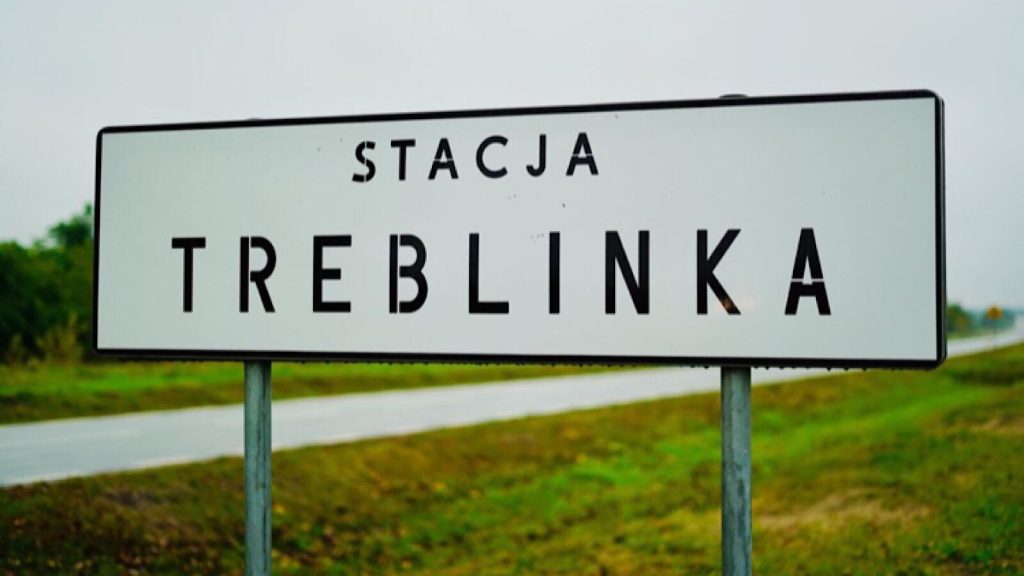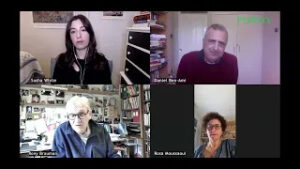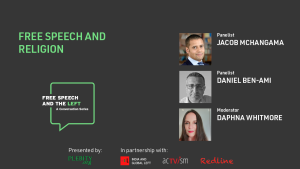
What does it mean, to ‘counter hate speech with more speech’?
Hint: it doesn’t mean 5 minutes for the Jews and 5 minutes for Hitler.
In 1971, over the course of several months, historian Gitta Sereny trudged regularly into a prison in Dusseldorf, Germany to sit across a small table from Franz Stangl, former commandant of the extermination camp Treblinka. Between April and June of that year, Sereny collected over 70 hours of interviews with Stangl who died on June 28–within hours of her last visit. For the following 18 months Sereny continued researching details of the stories Stangl had told her and to speak to people who had known him when he was in charge of killing operations at Treblinka.
As a result of her research, Sereny published Into That Darkness: An Examination of Conscience which recounts in unsparing detail the daily routines at Treblinka where some 700,000 men, women and children were delivered by train and then herded to their deaths.
Sereny’s work is just one bit of important research on the Holocaust among a wealth of scholarship and eyewitness accounts from both victims and perpetrators.
Nonetheless, just a few years after Sereny sat listening to Kurt Stangl describe the industrial killing process under his direct command, along came Robert Faurisson. Faurisson was a french literature professor whose obsessive hobby was writing numerous texts denying the Holocaust and one book in particular which gained considerable attention. That book, Mémoire en défense caused a stir, as much for its Holocaust denialism as for the fact that it included a preface written by the internationally known and respected intellectual, Noam Chomsky.
The Faurisson Affair
The story of Faurisson’s book, Chomsky’s preface and the ensuing controversy eventually came to be termed the Faurisson Affair.
Chomsky, it turned out, had written the preface as a general essay on freedom of expression and it had been added to the book at least initially without his knowledge. Under attack from numerous critics, he repeatedly made the point that he had never read Faurisson’s book, and that, in any case, his essay had nothing to do with supporting the actual content of the book or Faurisson’s ideas.
For Chomsky supporting free speech always meant supporting the principle specifically for the most detestable views. What’s more, he would repeatedly insist ‘that’s the only time when the issue arises’.
Criticism of his preface meant to Chomsky that his critics were confusing his support for Faurisson’s right to free expression with a supposed agreement with him on what he actually said.
Because they were unable, in his mind, to make that clear distinction, he advised them to ‘go back to the middle ages and start all over again.’
“Now if…[the people criticizing me] can fail to distinguish between defending rights and defending the theses expressed, they have to go back to the middle ages and start all over again.”-Noam Chomsky
In retrospect, it appears that Chomsky’s reaction may have revealed a large dose of academic defensiveness on his part. His more thoughtful critics weren’t really confused in the way he caricatured. Many of them were less concerned by his support for Farisson’s right to express himself than with other comments Chomsky made that went far beyond the issue of free speech and were explicit statements of support for Faurisson, the person. Chomsky had written that ‘from what he had read’ Faurisson was ‘not antisemitic’ and that he was actually some sort of ‘harmless, relatively apolitical liberal’. At the same time, he also absurdly declined to comment on the ‘specific subject matter’ of Faurisson’s book because he was ‘not an authority’.
One of the critics that engaged with Chomsky was the historian Gitta Sereny. Sereny and Chomsky crossed swords in an issue of the New Statesman where Chomsky called her a ‘neo-stalinist’ in spite of the fact that she actually agreed with him on the most important point–that suppressing Faurisson’s speech was ‘not the answer’. Repressing Faurisson’s speech, Seleny wrote, ‘merely contributed to a martyr’s image’.
The definitive response both to Chomsky and to the substance of Faurisson’s denialism came from French historian Pierre Vidal-Naquet whose own parents died at Auschwitz. Vidal-Naquet wrote an extended article entitled A Paper Eichmann (1980) – Anatomy of a Lie.
In the essay, he addresses both the substance of Faurisson’s denialism and why it should be addressed and not censored. Vidal-Naquet agreed with Chomsky that it was a mistake to suppress Faurisson and his Holocaust denialism. Unlike Chomsky, he took a very different position about engaging with Faurisson’s actual claims and with the idea of historical revisionism in general. As Vidal-Naquet wrote in this essay, “to live with Faurisson? Any other attitude would imply that we were imposing historical truth as legal truth, which is a dangerous attitude…”
Vidal-Naquet wrote extensively about Holocaust denialism, opposed laws making it illegal and invested considerable effort in refuting it. He agreed with Chomsky that the state should never be given the power to decide what is the historical truth.
I am resolutely opposed to the idea of imposing a historical truth through the legal system. When the French parliament voted for such a law in 1990, every single historian was opposed to it. If there is a lesson we should learn from the history of communism and the State or Party Truth, it is that no historical truth can depend on the state apparatus –however liberal this state– in order to be considered the Truth.
I do not believe [we should persecute them], in the name of truth, despite the legislation against them that has been adopted in Germany and France. Persecution, and even anything redolent of persecution, produces martyrs, and we have not the slightest interest in making these people into martyrs. – Pierre Vidal-Naquet
At the same time, he rejected the premise that the pseudo-scholarly claims of denialism were worthy of respect and should be considered simply another set of possible facts. He posed the question rhetorically, asking “..does an astronomer discuss things with an astrologist, or with a person who claims that the moon is made of green cheese?”
Chomsky was not wrong in saying that defending the principle of freedom of expression was most important in cases like Faurisson’s exactly because his speech was so detestable. But he seemed to have abandoned half of the moral equation to his critics such as Vidal-Naquet, who wrote “that one must fight against the disappearance –or, worse yet, the debasement– of memory seems to me obvious.”
Vidal-Naquet recognized the scale of that task, adding that “..to demolish a discourse takes time and space. When a fictitious account is well prepared, it does not contain elements allowing one to destroy it on strictly internal grounds”.
In reality, in spite of a great deal of unnecessary mudslinging, Chomsky and his best critics, such as Gitta Sereny and Pierre Vidal-Naquet together provide a model response to Holocaust denialism–a virulent form of hate speech wrapped in a cloak of pseudo scholarship.
Historical examples provide ample evidence that hate speech laws create martyrs whose ideas become more attractive. Outlawing ideas turns them into forbidden fruit, rendering them even more powerful.
When it comes to countering hate speech, there is no step by step set of instructions that we might have for, say, building a piece of Ikea furniture. Proponents of free speech are not arguing for what is often caricatured as a simple formula of ‘5 minutes for the Jews and 5 minutes for Hitler’. There is no simple solution to the problem of hate speech. It will always be present and must be both allowed and refuted.
Postscript: déjà vu
A little over a week ago, on November 10, Holocaust denier Vincent Reynouard was arrested in Scotland on behalf of French authorities who had been looking for him for two years. Reynouard had multiple convictions in France for Holocaust denial and most recently for antisemitic posts on social media. He was arrested on behalf of the French authorities and is expected to be extradited to France.
Arrest him, jail him. Elevate him to martyr status. Make his ideas that much more intriguing and appealing–set the stage for the next round.
Sources:
Pierre Vidal-Naquet
http://www.pierre-vidal-naquet.net/
A Paper Eichmann, Pierre Vidal-Naquet
http://www.anti-rev.org/textes/VidalNaquet92a/
The Grand Theorist of Holocaust Denial, Robert Faurisson, Paul Berman
https://www.tabletmag.com/sections/news/articles/robert-faurisson-holocaust-denial
The Faurisson Affair
Noam Chomsky writes to Lawrence K. Kolodney
https://chomsky.info/1989____/
Twitter, hate speech, and the costs of keeping quiet
https://www.cnet.com/tech/services-and-software/twitter-hate-speech-and-the-costs-of-keeping-quiet/
Shoah – hidden camera on former Treblinka Guard
https://www.youtube.com/watch?v=jtgXqNsXsrE
Gitta Sereny and Noam Chomsky argument in the New Statesman
https://files.libcom.org/files/Noam%20Chomsky%20and%20Gitta%20Sereny,%20%27New%20Statesman%27,%2017%20July%20and%2014%20August%201981.compressed.pdf
Chomsky on Banning Hate Literature
https://www.youtube.com/watch?v=ZPn2G3-o9dg
Chomsky on the Faurisson Affair
https://www.youtube.com/watch?v=qyVQzmuPEvs
The Holocaust Industry -Norman Finkelstein
https://www.normanfinkelstein.com/books/holocaust-industry/



